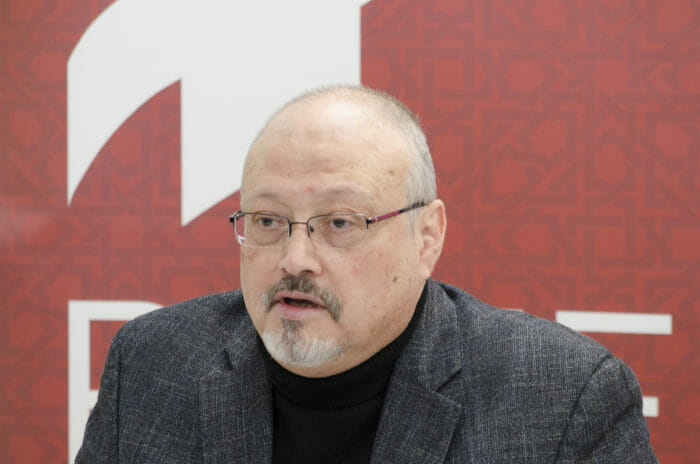Washington Post journalist, Jamal Khashogi, never exited the Saudi Arabian consulate in Turkey after entering it on October 2. Creative Commons/ POMED (Project on Middle East Democracy)
On October 2, Washington Post correspondent Jamal Khashoggi walked into the Saudi Arabian consulate in Turkey. He never walked out.
Turkish records show that Khashoggi was horribly mutilated and murdered by agents of the Saudi Crown Prince.
The response from Congress was swift and strong: this is unacceptable.
From the White House? Not so much.
At first, President Trump rushed to defend Mohammad bin Salman, imploring Americans to give the Saudi crown prince the “benefit of the doubt.” Then, when it became clear that Khashoggi’s death was in fact a government-orchestrated hit, the President made a thoroughly lukewarm and unsatisfying statement regarding an investigation.
Trump might be hesitant to condemn the Saudis simply out of affection-or at least out of respect for their absolute power. After all, he has demonstrated a concerning ability to quickly get chummy with notorious despots and autocrats.
But this is far bigger than the President. Even if he wanted to send a strong message to the Saudis regarding Khashoggi’s death, he couldn’t. His hands are tied.
But how did we get to this point? Why can’t our government push back against a dictatorial regime with a history of human rights’ violations?
For one, America is reliant, too reliant, on Saudi Arabia: Saudi oil accounts for nearly 12% of U.S. imports. Confronting the Saudi government would risk skyrocketing gas prices and a complete economic collapse.
But oil isn’t the only problem. Saudi Arabia is a major player in America’s military-industrial complex. The nation has pledged to purchase upwards of 14.5 billion dollars in weaponry from American manufacturers.
So although it’s undoubtedly a factor, our president’s respect for autocratic strongmen isn’t the real reason America can’t muster a response to Khashoggi’s death. We can’t respond because we have no leverage.
But when we have no leverage, when we’ve backed ourselves so far into a corner that we can’t condemn the brutal killing of a journalist by a dictatorial regime, when we’re locked in an arms deal and economically dependent on a nation with a long history of human rights violations, we’re doing something wrong.
For decades, we’ve simply backed the “lesser of two evils” in Middle Eastern conflicts. From Afghanistan to Syria, America has adopted the policy of arming less dangerous factions in hopes of overthrowing more dangerous ones.
That strategy has been a disaster. That’s precisely how America created ISIS, Al Qaeda, Hezbollah, and countless other organizations terrorizing the previously peaceful Arabian peninsula. Sure, we didn’t support these terrorist groups directly, and they were far less radicalized and dangerous when we armed them than they are now. But absolute power–state of the art military equipment in a far less developed area–corrupts absolutely.
Simply put, we shouldn’t support groups or governments we aren’t one-hundred percent certain won’t abuse the power that America grants them. And we cannot be so beholden to avaricious military-industrial schema that we’re willing to overlook atrocities committed by our supposed allies.
So this Khashoggi crisis is simply the latest in a litany of strategic failures. We arm and support the Saudis, hoping that their relatively stable regime will quell uprisings and squash radicalized rebellions.
And at face value, that policy works-until that same nation kills thousands in Yemen and mauls our journalists, and we’re forced to remain silent.
This isn’t to say that we should abandon the Saudis altogether. They remain one of our only reliable allies in an otherwise tumultuous region. But we must make it clear–despite the President’s repeated kowtows to bin Salman– that if Saudi Arabia wants our continued support, its leaders have to respect human rights and take responsibility for their actions.
We have to reexamine our modus operandi in the Middle East. Khashoggi’s death–and our lack of response–exposes its utter failure.
Jamal Khashoggi spent his life courageously advocating for democracy and freedom in the Middle East. The best way to honor and continue his audacious legacy is to stop enabling oppression and ignoring subjugation in the name of alliances and money.








